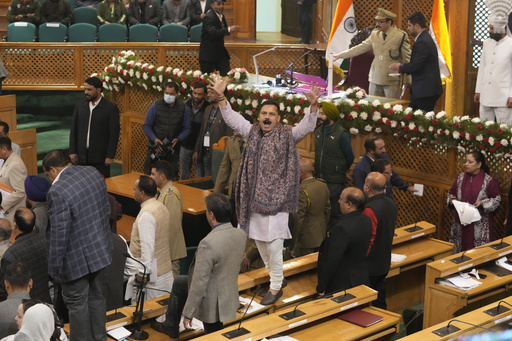
Srinagar, India — On Wednesday, the regional assembly in Indian-administered Kashmir adopted a resolution urging the federal government to reinstate the semi-autonomous status of the region, which was abolished by Prime Minister Narendra Modi’s government in 2019. This nonbinding resolution was approved amid vocal expressions of support and dissent within the assembly.
The text of the resolution explicitly calls for the Government of India to engage in dialogue with the elected representatives from Jammu and Kashmir to restore the region’s special status. The ruling Bharatiya Janata Party (BJP), which holds 29 seats in the 90-member assembly, opposed the resolution. It also now awaits endorsement from the Lieutenant Governor, Manoj Sinha, who is appointed by New Delhi and serves as the region’s highest administrator.
The National Conference party, which was responsible for introducing the resolution, recently won power in the region during its first elections in ten years. This election was particularly significant as it was the first since the BJP-led government revoked the special status of Kashmir, leading to its reclassification and division into two union territories: Ladakh and Jammu-Kashmir.
The controversial 2019 action, which was largely supported by Modi’s followers across India, has faced strong opposition within Kashmir, including from the National Conference, who view it as an attack on their identity and autonomy. There are widespread concerns that this move could lead to demographic alterations in the region, which has been fraught with tension, limiting civil liberties and curbing media freedoms.
Currently, the region operates under the status of a “union territory,” directly overseen by the central government, with the Indian Parliament serving as its principal legislature. The entirety of Kashmir is claimed by both India and Pakistan, despite each governing parts of the territory. The two nuclear-armed nations have engaged in two of their three wars over this contested region since their independence from British colonial rule in 1947.
Since 1989, militants in the Indian-controlled area of Kashmir have resisted New Delhi’s governance, with many local Muslims sympathizing with the insurgents’ objective of joining either Pakistan or establishing independence. The Indian government asserts that this insurgency is supported by Pakistan’s state apparatus, while Pakistan refutes these allegations, and many Kashmiris regard the insurgent efforts as a legitimate movement for freedom. The ongoing conflict has resulted in the deaths of tens of thousands, including civilians, insurgents, and government forces.
Despite announcing a commitment to restore the region’s statehood following electoral processes, both Modi and his influential home minister, Amit Shah, have indicated that they will oppose any initiatives aimed at reversing the changes made in 2019, leaving the timeline for potential statehood restoration uncertain.
